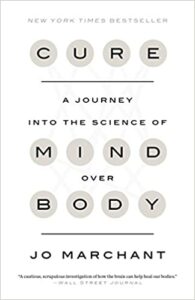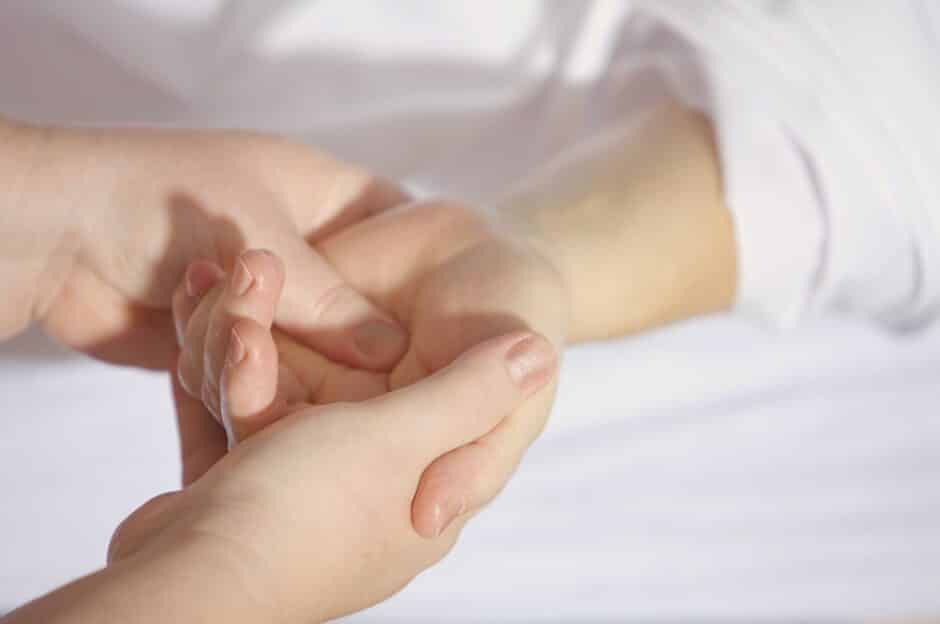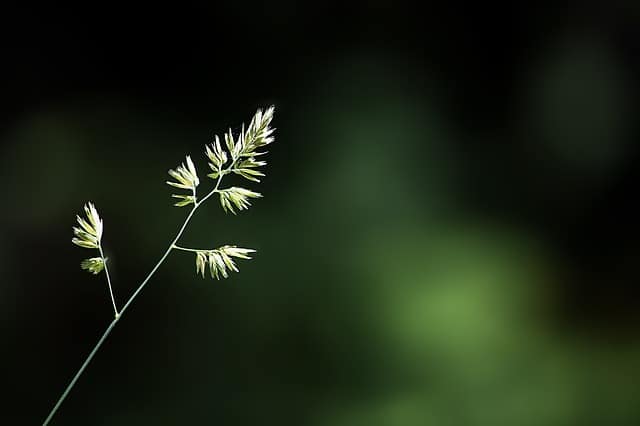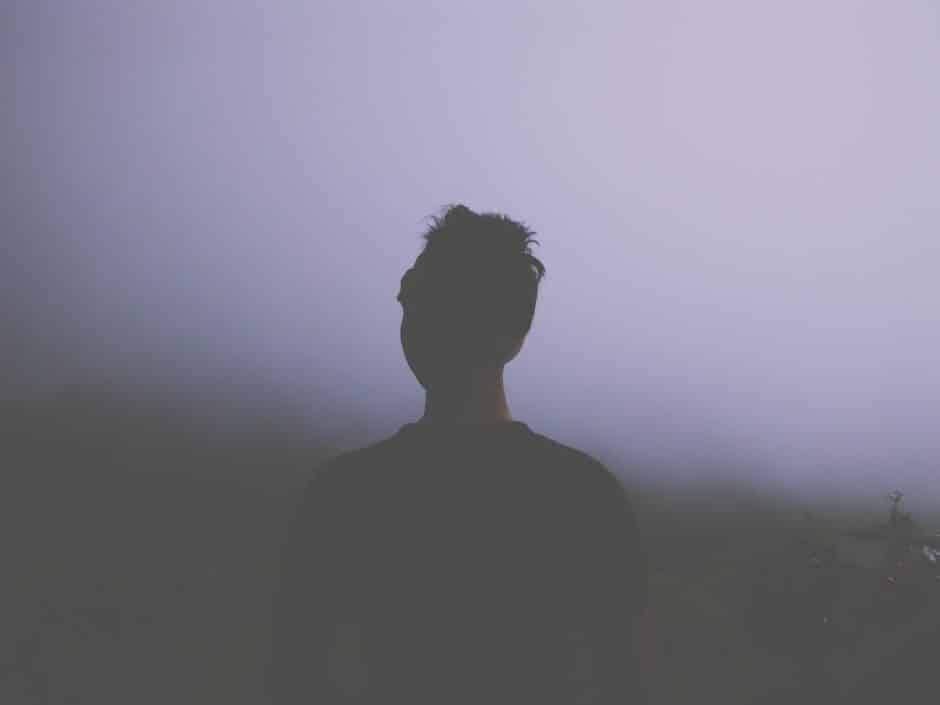I missed how my massage therapist always began with cradling my head in his hands. How, when he placed his palms over my ears, my skull filled with the ocean of my whirring aliveness, smoothing some jagged places in my psyche into round pebbles.
During the year of lockdown, I missed getting massages. I feel a little embarrassed or even entitled saying this since I’m grateful that during quarantine I was with my girlfriend: I had someone to talk to and touch. But I deeply missed the specific kind of touch I received during a massage, and being removed from it for a year underlined something to me: therapeutic touch is unlike any other kind—it holds within it the capacity for deep connection to the self, since we are composed of all the experiences our bodies hold, everything both joyous and jagged, every embrace and every injury, papercut-small and fissure-deep. Our bodies remember everything, including what our conscious mind has let slip away.
There is a specific experience I carry in my body: I went almost ten years with much touch of any kind, except the perfunctory; I hold this story in between my ears, and in my lower back, along my arms, and sometimes in a tight spot in my jaw: when my mother died, I was fourteen, and my father had a breakdown that no one talked about. Up until that point, even though my mother was slowly dying of cancer, I had a fairly nice life: my parents loved each other, we lived in a nice, somewhat affluent suburb, my interests were nurtured, and I always felt safe in my home.
Then, my life snapped off from everything familiar, as if a neat and manicured path unexpectedly diverged into wilderness that I had to navigate alone. Then, my father couldn’t take care of me, of my sister. Then, I had to go to my first year of high school and my home became a place that simply housed the relics of a civilization that had crumbled around me. Everything seemed wrong, even the colors of my bedroom walls. Suddenly, everything felt too yellow.
For many years, I wanted affection so much that my skin ached. I started getting migraines. Every morning, when I was sixteen years old, I dry heaved into the toilet not due to any eating disorder, but because the fact of my physical existence in a world where I knew there was no one to hold or take care of me made me feel literally sick. I was diagnosed with PTSD. Even when I felt “better” later in life, I still carried this time in my body the way a tree holds a year of blight in a dark hollow ring.
I stumbled into getting massages after a bad break up in my mid-thirties. The first massage therapist I saw, Stephen, was part of my queer community, and while other massage therapists had dug elbows into places that felt too tender, Stephen asked for what I needed before I got on the table. When I said I had PTSD and needed him to be gentle, he gave me the first massage that didn’t hurt, that I didn’t grit myself against, crying uncle. He seemed to understand: taking my first layer of protection off, all my clothes, except my bottom underwear, was an act of trust. “I’m going to listen to your breathing,” he said. “I’m going to make sure you’re ok.” As he wrapped the sheets and blankets around me near the end of that first massage, I felt deeply warm, and I let my head fall into his hands. I began going to see him every month for four years, and I found myself transformed: talk therapy had helped me, but massage soothed places words couldn’t touch. My body felt like someone had extracted an invisible burden from my body. I kept looking back into the train car as the subway doors closed, convinced I had left something heavy behind.
When I tell someone that I typically get a massage every month, they often looked confused or even judgmental. I don’t make much money, and massage has been branded a luxury, one doled out in spas only the wealthy can afford, and this is often the case. Even though I’ve been lucky because the massage therapists I’ve seen have worked out of their homes and operated on a sliding scale, a situation that benefits us both, I have paid around $75-100 a session.
But Massage is, as every book on it states, the oldest form of healing, and has gone by many names over the span of recorded history: rubbings, friction and unction, anatripsis, which translates to “intensive rubbing” in Greek. Only the recent century has demoted massage to empty pampering at best and sketchy sex work at worst. American and British Nurses in the late 1800s through the 1930s trained in and practiced massage. During WWI, nurses treated soldiers with massage for injuries and “nervous disorders” caused by the traumas of war. Medical professionals viewed massage as a “basic comfort” practice, and even famed nurse Florence Nightingale massaged patients and trained other nurses in what was deemed a valuable medical practice.
But by the mid-1930s when pharmaceutical solutions such as aspirin and morphine presented themselves, and it was less expensive to give someone a pill than it was to train a nurse in massage. Pushed from traditional medicine, massage parlors proliferated, and “happy endings” cast a lascivious light on the practice. Massage became either a form of sex work or a “complementary” healing modality.
I believe massage could be a more widely used practice, one that could benefit many, especially those who have gone through trauma, and while the pandemic continues to impact disenfranchised groups more than others, every single one of us will be continuing to deal with the stress of a pandemic, and we will likely continue to have periods of isolation, and with it, many will have to cope with a lack of touch.
In the year of no massages, I found myself taking more pills than I have in a long time: I washed countless blue over the counter anti-inflammatory pills down, hoping they wouldn’t eat away at my stomach lining. I diminished my supply of prescription muscle relaxants, the ones I save for when I feel as if I’m about to become immobilized, which happened far more frequently. When I feel a relaxant begin to bloom in my body, my muscles release as they do in massage. But I never feel better the way I do after a massage. I never wake up the next morning feeling like I’ve been rocked to sleep, like the hurt animal part of me has been sung to, like the music of my pulse has shifted.
There is something a pill isn’t offering me that a massage does: a human connection.
After my first massage therapist moved away, I worried I wouldn’t find someone I would connect with in the same way I had with Stephen. After I saw a few practitioners I didn’t quite click with, I found Josh on a queer community listserv. Like Stephen, Josh exuded a deep patience when he worked on me, and he listened carefully with his hands. I began to notice the distinct difference between being worked on by someone I saw just once and someone I bonded with over time. I’ve been seeing Josh for years now, too. Once when we sat together chatting after he had worked on me, I asked him if a client’s breathing and his would sync up during a massage. I’d been reading about circumstances that cause humans to fall into a kind of sync together; if people sing together, their hearts beat together, too. He thought a moment, and said, no, not exactly, but if a massage was going well, usually the person being massaged would breathe in a kind of unconscious call and response with him.
In her book Cure: A Journey into the Science of Mind Over Body, science journalist Jo Marchant explores the potency of human connection through examining what we think of as the placebo effect. She cites a study from Dr.Ted J. Kaptchuk, who performed “fake acupuncture”—acupuncture that didn’t follow the traditional meridians used in the treatment—to two groups of patients (one control group was given no treatment at all), the first group were given treatment by a “cold but polite” practitioner, and in the second group, the patients were treated by a warm practitioner who sat with them, and talked with them for 45 minutes before being given placebo acupuncture. Neither group received any other treatment for the primary complaint which was IBS. 44% of the patients treated with the placebo style acupuncture felt better, but Marchant reports that the patient’s experience of wellness shot up to 62% when offered care from a warm practitioner which was “as big an effect as has ever been found for any drug treated for IBS.” She notes that “If an empathic healer makes us feel cared for and secure, rather than under distress, this alone can trigger significant biological changes that ease our symptoms.”
human connection through examining what we think of as the placebo effect. She cites a study from Dr.Ted J. Kaptchuk, who performed “fake acupuncture”—acupuncture that didn’t follow the traditional meridians used in the treatment—to two groups of patients (one control group was given no treatment at all), the first group were given treatment by a “cold but polite” practitioner, and in the second group, the patients were treated by a warm practitioner who sat with them, and talked with them for 45 minutes before being given placebo acupuncture. Neither group received any other treatment for the primary complaint which was IBS. 44% of the patients treated with the placebo style acupuncture felt better, but Marchant reports that the patient’s experience of wellness shot up to 62% when offered care from a warm practitioner which was “as big an effect as has ever been found for any drug treated for IBS.” She notes that “If an empathic healer makes us feel cared for and secure, rather than under distress, this alone can trigger significant biological changes that ease our symptoms.”
In another study, done at Berkley, where researchers discovered that social messages could be communicated through touch with near lighting-fast speed. This of course makes sense since touch is our oldest form of communication, older than stories passed between us through language, much older than paper, or even marks carved into stones or animal bones, perhaps older than singing. Some anthropologists wonder if touch, specifically the kind of touch that releases oxytocin, the chemical released through bonding like breastfeeding, set our evolution in motion, making us a species capable of doing all the above.
Once Josh pressed a spot on my lower back and I tensed because sometimes when something hurts, I find myself unable to speak—I just freeze. But immediately I felt his hands respond, with a soothing message I can’t quite translate into language. It was this exchange, the feeling of being listened and responded to with such care, that felt so profound, perhaps even more so since it happened without either of us saying a word.
For a while I kept mixing up the word message and massage, constantly misreading the word “message” as “massage” or typo-ing message when I meant massage. I realized that massage has offered me a way to receive a wordless message my body has needed, on repeat, one that echoes in my skin and bones and muscles, in my breath and blood, one that tells me: even if my father couldn’t give me the comfort I needed when my mother died, other people will be there for me, and my community would be there for me.
There’s no doubt that I tend to choose male-presenting therapists since the hurt animal part of me grieved the loss my father as he lived, a ghost of himself; I mourned the father who was a gentle plaid mountain I climbed, who read me all the chronicles of Narnia, who made me and my sister heart-shaped pizzas. The death of my mother was one trauma–the loss of my father while he continued to sit on the couch staring at the wall was another. I struggled to hold the latter, the ambiguous grief of it, even more than the death of my mother; there was only a funeral to acknowledge one of these losses.
Through seeking this particular form of healing, I have gotten better at holding my history in my body. I’ve gotten better at holding the past in one place in my body while I moved forward; changing how I held my body, loosening its tensions and habits, made me a person who could hold the past while keeping my feet in the present. I got better at forgiving my father, even though neither of us ever brought up the past in conversation. My father got better too: he happily re-married, sold his business, and retired to a life of collecting ship replicas in a house a short drive from the beach.
This past July, I was standing alone in my kitchen when my stepmother called to tell me my father had died suddenly that morning. And so I found myself alone again as one of my parents died. I longed for my people—I longed for my girlfriend, who was waiting for me in rural upstate New York as I prepared to move from Brooklyn, I longed for my stepmother and the family I still had left alive; I longed for my friends, but I also longed for the person who had given me a source of comfort in other stressful times: my massage therapist, or put another way, despite the cheesiness the word has gathered over the past decades, my healer. I longed for my healer to cradle my head in his hands as I learned how to live with my father’s sudden death, as I learned how to hold this new reality in my body.
The longing for my healer, and even calling him this word, felt strange, even embarrassing, but we have no real word in American English to contain this kind of therapeutic relationship: one that technically involves a service, and yet, much like therapy we seek out for our minds, is imbued something more, something deeper and elemental.
Today, we are only beginning to break the taboo of even talking about the essential human need for touch, and it seems we only have these conversations under extreme circumstances. As the pandemic continues, I hope we can talk more about the need for touch. I also hope we can also seek out therapeutic touch if we need it. I hope that, in time, perhaps massage can be seen as what it is: a healing practice with potential far beyond what we have imagined. I hope that if massage can be witnessed in this way, perhaps, it can be covered by all insurances, so it could become more accessible. And no matter what, I hope we can all feel less embarrassed to seek out a therapeutic space for touch when we need it.
Kat Savino holds an M.F.A. from Columbia, and wrote a brief personal essay about how massage helped her heal from trauma for Narratively; She has been researching this practice for many years and is currently working on a long hybrid memoir that fuses art history, psychology, and neuroscience to explore the need for touch, and the trauma of abandonment, and how healing is possible. Kat has also published essays in Ravishly, Apogee, Marie Claire, Belladonna: Matters of Feminist Practice, The Los Angeles Review, and Prism International, where she placed third in their nonfiction contest.
We are looking for readers and/or wordpress editors.
Find out more here.
*********





